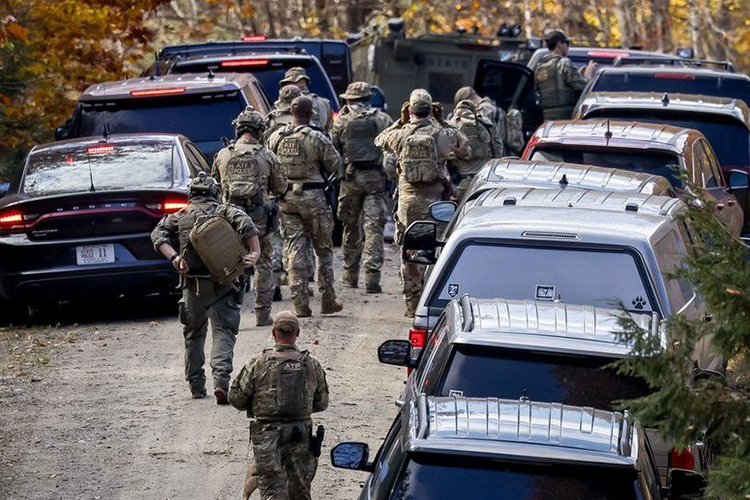
Maine state police search through Sagadahoc county tirelessly in hopes of finding Robert Card. photo by CJ Gunther
The shooter’s family warned officials he was a violent threat before the devastating incident unfolded.
The 25th of October marks the state of Maine’s worst shooting to date. On that Wednesday night, 18 residents of Lewiston, Maine, were shot and killed, prompting the Lewiston Police Department (LPD) to enact a two day manhunt in search of the suspect. The following Friday, shooter Robert Card was found dead due to self-inflicted bullet wounds. A deeper dive into Card’s mental health history reveals how this tragic shooting could have been prevented.
At 6:56 p.m., 911 operators were notified that shots were being fired inside of Just-In-Time Recreation, a local bowling alley. Just 12 minutes later, authorities received another call reporting that shots had been fired at Schemengees Bar and Grille, located four miles away from the bowling alley. Card committed two mass shootings in this short time frame, killing seven civilians at the bowling alley and eight at the restaurant. Despite being rushed to the hospital, three more victims passed, bringing the total up to 18 deaths. Among these undeserving souls were participants in a corn-hole tournament for the deaf as well as Just-In-Time Recreation manager, Tommy Conrad, who is survived by his nine year old daughter, and Aaron Young, who was the youngest victim of the shooting at just 14 years old.
To prevent further losses in Lewiston following the shooting, the LPD posted on Facebook at 8:06 pm, advising residents to stay sheltered in their homes. By midnight, authorities found the shooter’s vacated getaway vehicle – a white Subaru Outback – in Lisbon, a town located eight miles southeast of Lewiston. Additionally, authorities were able to pin down Card as a potential suspect. Citizens of Maine spent the next two days on high alert, while state officials continued their massive manhunt.
On Friday, October 27, Card was found dead inside a trailer in the overflow lot of his former employer, Maine Recycling Corporation. Authorities ruled Card’s death was a suicide. Later, the Maine Chief Medical Examiner revealed to CBS news that Card ended his life likely 8-12 hours before he was located. Police also discovered a suicide note Card left in his home addressed to his teenage son.
Many people in Card’s life had been concerned about his deteriorating mental health for months leading up to the shooting. Up until the massacre, Card served in the Federal Army Reserve. Sheriff’s Department Incident Reports uncovered that last July, Card accused fellow soldiers of calling him a pedophile and even got into a physical altercation with a long-time friend. After administering a psychological evaluation, an Army psychologist recommended Card was in need of additional care. In mid-July, Card was sent to Four Winds Psychiatric Hospital for two weeks of treatment. Two months later, the Army Reserve requested another health check on Card after a soldier reported hearing Card threaten to shoot up their Army base. Even those closest to Card had lost their trust in him, showing how this tragedy could have been prevented.
Early last May, Card’s ex-wife and son made a visit to the Sagadahoc Sheriff’s Office in Maine. Here, they reported numerous indications that Card was a potential threat to the public. The two revealed that Card had a stash of 10-15 guns, and that his mental health had been “seriously deteriorating.” Card’s son even disclosed that his father had been hearing and responding to voices when nobody else was around.
This string of red flags could have been the end of this situation. However, despite multiple warnings to police and army officers, Card remained a threat, enabling him to commit a mass atrocity.